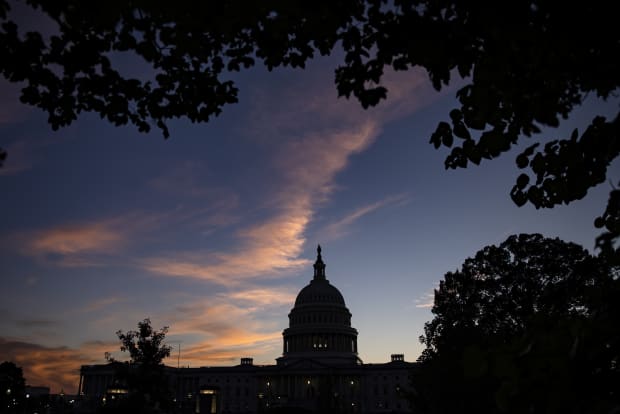This post was originally published on this site

(Photo by Samuel Corum/Getty Images)
Democrats are expected to move quickly in 2021 on some big-ticket items if they win control of the U.S. Senate, but that expectation should be tempered by the possibility of an evenly split chamber or one where control won’t be determined until January, according to experts.
Both scenarios, a Democratic lead that could still be negated by one or two runoff elections in Georgia or a 50-50 Senate tie that could be controlled by Democrats but take longer to organize, could blunt any legislative momentum a Democratic president would try to create.
Tony Fratto, a former spokesman for the Treasury Department and the White House in the George W. Bush administration, pointed to Georgia’s system of post-November runoffs. If Democrats take a lead on Election Night but one not big enough to offset a pair of GOP wins later, the outcome of Senate control would still be up in the air.
“I personally think that’s the most likely outcome, to be honest with you. After all, it is 2020, right?” he said.
Georgia has been seen as a target of opportunity for Democrats. Democrat Jon Ossoff has run a tight race with the incumbent, Republican Sen. David Perdue. At the same time, Democrat Rev. Raphael Warnock has led a crowded field in the second race where incumbent Republican Sen. Kelly Loeffler and Rep. Doug Collins have split much of the GOP vote. But to win outright in either race would require one candidate to get at least a majority of the vote. If no one wins a majority, the top two finishers face off again in a runoff election.
Republicans currently hold a three-seat majority in the 100-member body. Democrats control 47 votes, though two of those seats are held by nominal independents who caucus with Democrats, Bernie Sanders of Vermont and Angus King of Maine.
The Cook Political Report has put the projected Democratic gain at two to seven seats, while Inside Elections with Nathan L. Gonzales projected a Democratic gain of between four and six seats, though with more possible.
“Democrats still need to get three seats assuming Joe Biden wins the presidency, and four if he doesn’t,” wrote Cook’s Jessica Taylor.
Jim Manley, who was a spokesman for former Democratic Senate Majority Leader Harry Reid, said a 50-50 Senate split would mean potentially months of Senate negotiations over how committees are apportioned and who sits on which ones, even as the party of the vice president would determine party control.
While those talks happen anyway at the start of each new Congress, clear majority control usually makes them easier. The last 50-50 Senate was seen in the 107th Congress of 2001 to 2003, and flipped control through a party defection and a senator’s death.
Reorganizing in an evenly split Senate would require the two parties be willing to make a deal, Manley said, a tough prospect in a chamber that has become more partisan.
“There’s no goodwill left in the Senate,” he said.
If Democrats win control, it would have big implications for things like another coronavirus economic package and a Biden legislative agenda in early 2021.
Manley said he was “very skeptical” that a stimulus package could be worked out in a lame-duck session before the new Congress meets if the Democrats won, as Republicans would prefer instead Democrats do the legislative heavy lifting once they formally take over in January.
At that point, he said, he expected Democrats to start passing budget resolutions that would allow them to use a procedure called budget reconciliation to pass bills with only 51 votes.
“I expect that House and Senate leaders will move quickly to execute one and possibly two budget resolutions for [fiscal] ’21, ’22 that allow them to use reconciliation,” he said.
Fratto agreed that using the reconciliation process, which gives filibuster protection to some spending and tax bills, to get a quick win for a Biden White House was likely, but he was more optimistic than Manley on the prospects for at least a minimal stimulus package in the postelection lame duck session.
It would be “malpractice,” he said, for lawmakers to not move another stimulus now that the impact of the initial one in March is wearing off and the election would be in the rearview mirror.
The big question for a Democratic Senate would be the margin. A narrowly held Senate would empower moderates in both parties, like Sen. Joe Manchin among Democrats and Sen. Mitt Romney and Sen. Lisa Murkowski among Republicans, to try to cut deals. A larger cushion would allow more freedom for Democratic Leader Chuck Schumer to push back on a more liberal House, they said.
“It may be all the difference in the world,” Manley said of the margin.
If Republicans hold on to the Senate, both said it would be tough sledding for a Biden White House, with Manley saying legislative wins would be “few and far between.”
While Biden has said he hopes Republicans will be more likely to cut deals with him, instead of a more liberal Democrat in the Oval Office, Fratto said that was not necessarily so.
“They’re not going to deal because he’s a nice, even if he is a nice guy,” Fratto said.


